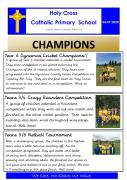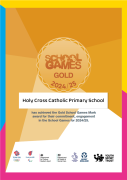PE

What makes a good PE pupil at Holy Cross?
A hunger for trying new games, activities and skills, with a willingness to make mistakes in order to improve. A student with an ability to work successfully as an individual but also someone who contributes effectively within teams and looks to support others while developing self.
 |
PE at Holy Cross |
 |
|---|---|---|
Intent |
||
|
A high-quality physical education curriculum inspires all pupils to succeed and excel in competitive sport and other physically-demanding activities. It provides opportunities for pupils to become physically confident in a way which supports their health and fitness. There are then opportunities to compete in sport and other activities which allows children to build character and help to embed values such as fairness and respect, that they will take with them through their lives. |
||
Implementation |
||
|
High quality teaching that is appropriately pitched to individuals and develops subject specific vocabulary and skills Providing a range of sporting activities for children to explore Children given opportunity to develop a range of physical skills, intrinsic values and a knowledge about how to lead a fit and healthy lifestyle Enrichment opportunities such as extra-curricular clubs where we support and provide entry into competitive events Intra competitions where children can compete within their school houses Succinct assessment based on key skills and understanding which ensures learning is well pitched and matched to individual needs PE has a high profile within the school community and children enjoy regular lessons that are highly valued Follow a clearly sequenced and progressive program of study based on the National Curriculum objectives Nurturing a resilient learning attitude towards PE and building cooperation, individuality and sportsmanship Inspiring children to search for further engagement of sport in clubs outside of school. |
||
Impact |
||
|
Children confidently apply their health and well-being knowledge to their own lives on a daily basis. Children will discover new interests and talents that can lead to interests outside of school and joining of new communities and sports teams. The outcomes at the end of each Key Stage are good or better. Children gain regular access to exercise which has a positive impact on their mental health and well-being. The wider vocabulary learned is then applied to other areas of the children's learning and they show an understanding of how exercise has a positive impact on both the body and mind. Children enjoy PE lessons and confidently support one another in them situations. They show confidence when performing individual sports and learn to be creative in their planning of routines. The children are critical of their performances and use this to improve further. Children enjoy PE lessons and learn to be confident enough to have a go at developing and applying new skills. Children develops the skill of agility, coordination and balance, which are predominantly used on a day to day basis. It allows opportunities to be creative and express themselves in different ways.
|
||
PE in the Early Years Foundation Stage
The Early Years Foundation Stage Curriculum and carefully planned provision are designed to support children’s physical development. We offer daily playful opportunities for children to engage in physical activity both in and outdoors. Our children have access to free flow play for sustained periods of time and are encouraged to use our large outdoor environment. We access this environment all year round and in all weather conditions to support the development of gross and fine motor control, balance, coordination, confidence and problem solving skills. We explore relaxation techniques and share a range of healthy snacks to develop our understanding of the importance of a balanced and healthy lifestyle.
How do pupils learn?
-
Class timetables have been built to ensure a broad and balanced curriculum.
-
PE is taught explictly at least twice per week.
Retrieval Practise
Retrieval practise is planned into the curriculum through spaced learning and interleaving and as part of considered task design by the class teacher. Teaching and learning resources and provided for class teachers so they can focus their time on subject knowledge and task design.
Inclusion
Within PE all pupils will take part in all the lesson sequences, but we need to be clear about the critical core content for pupils with SEND.
As part of the planning and preparation for the delivery of each block, teachers will need to consider how specific activities, or the delivery, may need to be adjusted to ensure that pupils with SEND are able to access the materials and participate fully in the lesson.
Pupils with language and communication difficulties (including those with ASD) may need additional visual prompts to help them understand what is expected of them. The task could be broken down into smaller, more manageable chunks and individual task boards used to demonstrate these.
Some pupils may have sensory sensitivities. For those pupils, adjustments may need to be made in order for them to access materials.
Pupils who have difficulties with tasks requiring fine motor skills may need appropriate adjustments to be made to enable them to access the task and / or in order to keep them safe.
Knowledge notes will also be chunked to ensure learners understand key content.
This will then lead to our assessment framework. Some pupils may show extended knowledge and be skilful with it from other lessons.






